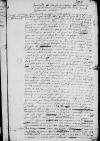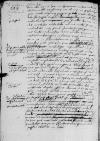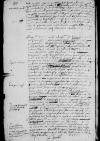Letter #1770
Ioannes DANTISCUS to Diego GRACIÁN de AldereteLöbau (Lubawa), 1537-11-16
English register: IN LETTER: Dantiscus is replying to Gracián’s letter. He explains that his reply comes late because he was waiting in vain for a reaction to his proposals, presented to a few friends and Isabel (Delgada), concerning the future of his daughter (Juana Dantisca). Dantiscus writes that he presumes Gracián knows about his letter to Isabel on this matter. He accuses Isabel of wanting to sell his own child to him, which is why he considers her to be mentally deranged. He notes that Isabel’s offer can be understood as questioning his fatherhood (“after all, who would buy something they knew was their own?”). Dantiscus writes that he wishes Gracián well, so he will not oppose his marriage (to Juana Dantisca), even though it was agreed upon without asking his consent. He promises that after the sacrament is fulfilled, he will also offer his material support. He reminds Gracián that in view of the bride’s young age he should take care of her upbringing and education. To Gracián’s request that he obtain, from the Polish king, the function of representative of the Kingdom of Poland at the imperial court for him, Dantiscus replies that this function is currently filled by Dantiscus’ aide from the times of his diplomatic service, Fabian (Wojanowski), whom Isabel knows and Gracián surely does too. Dantiscus promises to write to him to contact Gracián on the matter of helping him with his duties. Dantiscus refuses to pay Isabel an annual salary because she did not accept his terms. However, he asks Gracián to pay her 20 ducats that he will reimburse him for when the opportunity arises. He declares that if Isabel were to abandon her current licentious lifestyle, she can expect annual support from him, but he doubts if such a change of nature is possible. Dantiscus states that he has no time to write a longer letter because he is currently arranging to send money to Rome to pay for the confirmation of his election to Warmia bishop. He notes that the Warmia diocese to which he is transferring is three times wealthier than the Chełmno diocese. IN POSTSCRIPT: Dantiscus refuses to pay his daughter a dowry. He argues that he would incur a double loss – her marriage to Gracián means he will be separated forever from his child. Dantiscus claims that if Isabel had agreed to send his daughter to him without demanding money for this, he would have supported her financially so that she wouldn’t be forced to continue to make a living from prostitution, and would have remembered her in his testament as well, and found a worthy husband for his aughter. However, he declares that he will offer as much support as he can to Gracián and Juana once the marriage is consummated. In very bitter words, he supposes that despite the bride’s young age this has probably already happened. He promises that he will soon send his daughter a gift that will serve as a memento of her father.
Manuscript sources:
Prints:
| ||||||||||||||||||||||
Text & apparatus & commentary Plain text Text & commentary Text & apparatus
Ioannes de Curiis Dantiscus, episcopus Culmensis etc. et ad ecclesiam Varmiensem postulatus etc. Domino Iacobo Graciano salutem.
Quod cf.
Ex
Postscript:
Non abs re et hoc, mi Graciane, in tuam notitiam deducendum existimavi, ne de me in posterum quoquo modo conqueri possis, quod ratione dotis, quam tibi fortassis amplam , nihil debebo,
[1 ]
[2 ] Mandragora is a Mediterranean medicinal perennial plant with a forked root shaped like a human figure; the ancients ascribed narcotic, soporific and magical properties to it; Circe used a mandragora brew to turn humans into animals (cf. KOPALIŃSKI 1990 p. 646 ⌊Kopaliński, p. 646cf. KOPALIŃSKI 1990 p. 646 ⌋; cf. also e.g. cf. Plin. Nat. 25.147.5 mandragoran alii Circaeon vocant ⌊Plinycf. Plin. Nat. 25.147.5 mandragoran alii Circaeon vocant ⌋ and cf. Adagia 1526 No. 3464 Bibere mandragoram (eandem Circeam appellant) ⌊Erasmuscf. Adagia 1526 No. 3464 Bibere mandragoram (eandem Circeam appellant) ⌋
[3 ] Elleborum (hellebore), a plant used in ancient medicine as a remedy for mental diseases as well as a reviving tonic and a laxative (cf. e.g. Porph. Com. in Hor. Art. 300.2 Locus est in Achaia Anticyra, ubi elleborum nascitur, quo sumpto dementes sanantur. Hoc etiam sumpto et dolor capitis sanatur.; there are also mentions of madness being treated with hellebore in the works of cf. Pl. Men. 913, 950 ⌊Plautuscf. Pl. Men. 913, 950 ⌋, cf. Mart. ⌊Martialiscf. Mart. ⌋ and cf. Col. ⌊Columellacf. Col. ⌋
[4 ] Dantiscus received letters recommending Gracián from: Juana Dantisca (cf.


